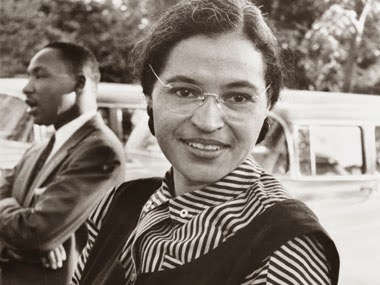9 Ordinary People Who Changed History
Rosa Parks: Wouldn't Give Up Her Seat
Tired from a full day's work, Rosa Parks
boarded a Montgomery bus on December 1, 1955. When she refused to obey
the driver's order to give up her seat in the "colored" section for a
white person, she was arrested for civil disobedience. Parks' act of
defiance, and the Montgomery Bus Boycott that followed, are recognized
as pivotal moments in the Civil Rights Movement.
Todd Beamer and the Passengers of Flight 93: Fought Back Against 9/11 Terrorists
When account manager Todd Beamer and the
other passengers on United Airlines Flight 93 realized their plane had
been seized by terrorists, they worked quickly and courageously to
reclaim control. Flight 93 crashed in a field in Shanksville,
Pennsylvania, but the passengers' brave resistance galvanized America at
its darkest moment since the attack on Pearl Harbor.
Mohammed Bouazizi: Sparked a Revolution
Tunisian street vendor Mohammed Bouazizi never had any dreams bigger than saving enough money to rent or buy a pick-up truck.
But when he set himself on fire out of desperation in December 2010, he
became a symbol of the suffering of all Tunisians. Bouazizi's death
inspired the nationwide unrest that resulted in the overthrow of
Tunisian dictator Zine El Abidine Ben Ali. The Tunisian uprising, in
turn, led to the Arab Spring movement that ultimately toppled regimes in
Egypt and Libya.
Candy Lightner: Stood Up Against Drunk Driving
After her 13-year-old daughter was killed
by a repeat DWI offender, Candy Lightner founded Mothers Against Drunk
Driving (MADD) in her home on March 7, 1980. Before MADD, there were
little to no legal consequences for driving while intoxicated; her
organization transformed American attitudes about drunk driving and
successfully fought for stricter laws across the country.
J. K. Rowling: Inspired a New Generation of Readers
Newly divorced and struggling to make
ends meet, single mom Joanne Rowling turned to work on the novel she had
been outlining for five years. Harry Potter and the Sorcerer's Stone
was published in 1997 under the name "J.K." Rowling—her publisher
didn't believe a woman's name would appeal to young boys. Six books and
10 years later, Harry Potter has shattered sales records and enthralled millions of reader of all ages.
Frank Willis: Did His Job...and Brought Down a President
On June 17, 1972, security guard Frank
Willis was making his midnight rounds at the Watergate office building
in Washington, D.C., when he noticed tape over the lock of a basement
door. Thinking another worker had left it there accidentally, he removed
it. Willis later found tape again in the same place. He called the
police, and the rest is history. Two years later, President Nixon
resigned in disgrace over his involvement in the coverup of the
Watergate break-in.
Ryan White: Raised Awareness of AIDS
Ryan White, a teen from Indiana, was a
hemophiliac who contracted AIDS through a blood transfusion. He passed
away at 18, with family and Elton John
by his bedside. Through his struggle with the disease, White became the
new face of the epidemic, debunking the myth that AIDS afflicted only
drug users and the sexually promiscuous. His fight for fair and equal
treatment from his public school system helped expose the discrimination
faced by AIDS patients.
Lilly Ledbetter: Fought for Equal Pay
Upon retiring from Goodyear after nearly
20 years, Lilly Ledbetter sued the company in 1998 for paying her less
over the years than her male coworkers. The lawsuit climbed the judicial
ladder until it reached the Supreme Court. Although they did not rule
in her favor, Justice Ruth Bader Ginsberg wrote a stirring dissent.
Congress subsequently passed the Lilly Ledbetter Fair Pay Act in 2009,
changing federal law to better protect women in the workplace.

















